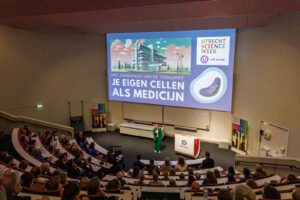SEPTEMBER 26 TO
OCTOBER 5 2025
OCTOBER 5 2025
SEPTEMBER 26 TO
OCTOBER 5 2025
OCTOBER 5 2025
A new knee with your own cartilage cells? Or a world where there is no shortage of donor organs? It sounds like future music, but during the well-attended public event ‘Ziekenhuis van de Toekomst’ (Hospital of the Future) on Tuesday 1 October at UMC Utrecht, it turned out that reality is closer than you think.
Regenerative medicine
The theme of the evening was regenerative medicine. This aims to develop new treatments that take advantage of the body’s ability to repair damaged tissue itself. During the evening, there were very interesting presentations and demos that gave visitors a unique insight into the future of medicine.
Stem cells
After the introduction by Carina Hilders, chairman of the Executive Board of UMC Utrecht, and Stephan van Duin, University lecturer and biologist Joost Fledderus gave a clear explanation of what stem cells are, why they are so important for medicine and how they could change the future of treatments. Stem cells, form the basis of the human body and through division are able to change into other cell types.
A new knee with your own cartilage cells
Orthopaedic surgeon Roel Custers gave visitors more insight into the effective treatment of osteoarthritis (a decrease in cartilage around a joint) through the use of stem cell cartilage transplantation.
Repairing DNA
Next, paediatrician Sabine Fuchs told an impressive story about treating children with metabolic diseases. These are often serious diseases caused by a mistake in the DNA. Advances in genetic techniques are making it increasingly possible to repair faults in DNA.
Alternatives to dialysis and repairing brain damage
After the break with interesting demos, nephrologist Karin Gerritsen explained her research on how we can make dialysis better, more sustainable and less stressful for patients by using smart materials, chip technology and kidney cells. Paediatric neonatologist Manon Benders explained how stem cells can repair brain damage in newborns.
The costs of innovation
Finally, health economics researcher Renske ten Ham addressed the cost side. Cell and gene therapies are often much more expensive than regular treatments, but essential for curing a patient. Renske develops models to support reimbursement decisions.
Impressive evening
Overall, a very impressive evening during the Utrecht Science Week, in which visitors were taken through the wonderful innovations within the field of medicine at UMC Utrecht, in cooperation with many other parties and organisations.
